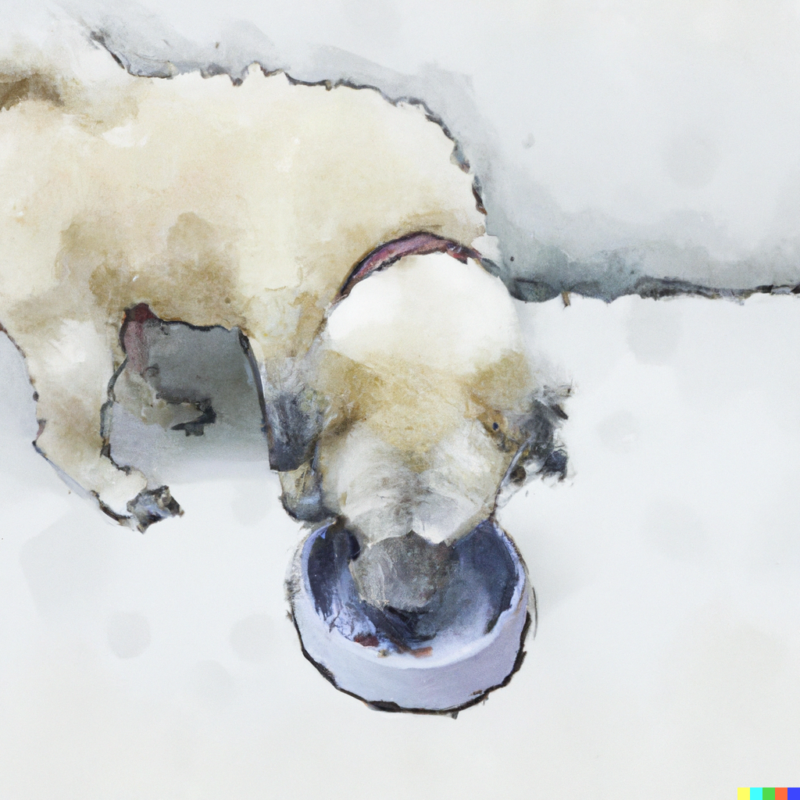Your Questions on Veterinary Nutrition
Introduction
When Kelly noticed her furry companion, Daisy, was constantly itchy and scratching during the early days of spring, she couldn’t help but wonder if her pet’s diet could be playing a role. As she dug deeper into the world of veterinary nutrition, she was surprised to discover a wealth of information and countless questions waiting to be answered.
Veterinary nutrition is a field of study that focuses on the nutritional needs of animals. It is an essential part of animal health care, as proper nutrition can help to prevent and treat many diseases. Veterinary nutritionists work with veterinarians to develop tailored diets to meet each animal’s needs.
Good nutrition is essential for keeping dogs and cats healthy and vital. Therefore, it is crucial to choose the right food and adhere to a sound diet to ensure that your pet has a good quality of life.
It is essential to consult with your veterinarian before switching to any new pet food products or giving your pet supplements. Your veterinarian can let you know what type of food works best for your pet’s needs and answer any questions you may have about pet nutrition.
Basics of Pet Food Nutrition
To stay healthy, cats and dogs require a balanced diet that includes proteins, fats, carbohydrates, vitamins, and minerals sources such as fish, beef, and poultry provide proteins, while healthy fats come from animal fats and seed oils.
Carbohydrates can be obtained through grains such as wheat, corn, and soy, while minerals should be formulated for species, breed, age, and size. Pet owners should con lt their veterinarian with any supplements if they eat a diet that meets the AAFCO standards – which all commercial diets should!
Good nutrition is necessary for sustaining, developing, and reproducing in animals. Proper nourishment is of utmost importance during pregnancy and post-operation/illness of pets. To advance adequate nutrition, pet food must possess proteins, fats, carbohydrates, water, vitamins, and minerals. Appropriate nutrition helps strengthen the pet’s immune system, which guards against disease and maintains healthiness.
Creating a Healthy Diet for Your Canine with the ABCs

A balanced diet is essential for the health and well-being of our canine companions. Dogs require a variety of proteins, fats, carbohydrates, vitamins, minerals, and water to remain healthy. Protein sources include chicken and turkey, beef and lamb, pork in limited amounts, salmon, and other fish.
Fats and fatty acids may be found in animal fats, vegetable oils, and fish oils, and Carbs may be found in grains like wheat, corn, and soy. Vitamins and minerals should be formulated for your dog’s species, breed, age, and size.
To have a balanced diet, your pet needs carbohydrates like rice, pasta, and oatmeal; fiber from carrots, pumpkins, apples, dark leafy greens; vitamins like A, B, C, D, E, K, and choline; and minerals such as calcium phosphorus magnesium potassium sodium chloride that are essential for muscle contraction and nerve impulse transmission.
Fresh water should always be available to ensure adequate hydration. Commercial diets provide the right amount of minerals for species breed age, but it is essential to check the ingredients list to ensure that your pet gets the right balance of nutrients.
Energy-Producing Nutrients
Proteins, fats, carbohydrates, water, vitamins, and minerals are all essential nutrients for the body. Proteins are necessary for building and repairing organs and tissues and providing material for enzymes and hormones.
- Fats provide energy and absorb fat-soluble vitamins while containing essential fatty acids.
- Carbohydrates are converted into energy to support bodily functions and produce body heat. Water is vital for the body’s inside and outside cells, and water is critical for the body inside and out.
These energy-producing nutrients are vital in keeping us healthy by providing the fuel we need to function correctly. Without them, our bodies would be unable to perform basic tasks such as digesting food or fighting off infection. Therefore, eating a balanced diet rich in these nutrients is critical to maintaining good health.
Non-Energy Providing Nutrients
Not all nutrients produce energy; some help regulates their body’s processes. These non-energy-giving nutrients do many important jobs. Examples include vitamins, minerals, and antioxidants that ensure animal growth and development.
- Water is an essential nutrient that does not produce energy, but the body must function correctly. It helps to regulate body temperature, lubricate joints, and transport nutrients and waste products throughout the body. Water also helps to maintain blood volume and pressure, as well as aiding in digestion. Without water, our bodies would not be able to survive.
- Vitamins play a significant role in keeping us healthy by aiding digestion, vision, immunity, and neurological activity. In addition, they are essential organic compounds needed in small quantities for growth and well-being.
Vitamins are divided into two categories: fat-soluble vitamins (A, D, E, K), which can be stored in the body’s fatty tissues, and water-soluble vitamins (B-complex vitamins and vitamin C), which must be consumed daily because they cannot be stored in the body.
Vitamins are complex molecules with particular roles in biological systems. Therefore, animal diets must contain adequate amounts of these vital micronutrients for optimum performance. As a result, there is increasing interest in understanding more about how different forms of vitamins affect animal health and performance.
- Minerals are essential structural components of body tissues, such as bones, muscles, and enzymes. At the same time, trace elements regulate metabolic pathways or serve essential functions as antioxidants in enzymatic reactions. Minerals are also necessary for metabolic processes; they include calcium, phosphorus, magnesium, iron, sodium, potassium, and chloride. Therefore, carefully selecting mineral sources is essential to ensure optimal nutrition and animal health outcomes.
Common Pet Nutrition Questions
It’s essential to understand the role of each nutrient to ensure that animals receive the right balance of nutrients for optimal health. But what questions do you have about veterinary nutrition?
What Nutrients are Necessary for Pet Health?
To foster appropriate body development and operation, pets must garner essential nutrients. Not only is hydration contingent on water, but also proteins are a must for cellular growth, muscle protection and maintenance, and reproductive duty. In addition, fats afford energy, healthy skin and coat, vitamin assimilation, and insulation.
In addition, carbohydrates give speedy energy and bolster intestinal tract health. Finally, vitamins and minerals are necessary for chemical responses in cells and tissues, aiding bone and cartilage production.
To meet their nutritional requirements, cats and dogs must have a balanced diet containing proteins, fat, carbohydrates, minerals, vitamins, and water. Of these components, fat is the most important.

Curated to meet AAFCO standards for an animal’s species, age, size, etc., commercial diets take away the need for dietary supplements. Therefore, consult a veterinarian if you have questions about your pet’s diet or nutrition.
Which Diet is the Most Suitable for My Pet?
When selecting a diet for your pet, there are several factors to consider. First, look for foods made by reputable companies with a long history of producing quality diets with an AAFCO statement on the label. Avoid diets formulated by computers to meet AAFCO nutrient profiles and newer/smaller companies with less experience in diet formulation. It is also essential to select a diet your pet does well on and avoid unverifiable claims, nutrition myths, and bashing other manufacturers’ products.
It is also important to note that pets have no one-size-fits-all diet; the best diet depends on the individual pet. Also, the expense does not necessarily equate to quality; expensive and inexpensive diets can be nutritionally sound. When choosing pet food, look for manufacturers with stringent quality control protocols, expert nutritionists and food scientists, and research-backed claims. Researching different pet food brands can help you decide what is best for your pet.
Does Examining the Ingredients Can Help Evaluate the Quality of Pet Food?
Ingredient lists can be a valuable tool for determining pet food quality, but other factors should be considered. For example, manufacturers may manipulate the order of ingredients to make them appear more nutritious than they are, and some may add ingredients for marketing purposes that have no real benefit.
Additionally, terms like “human grade” have no legal meaning in the pet food industry and do not necessarily indicate higher quality. Pet owners should research pet food companies to ensure they have a board-certified veterinary nutritionist on staff and that the food is complete and balanced for their pet’s life stage, according to AAFCO. Recommended brands include Hill’s, Purina, Iams, and Nutramax.
Vegan diets may be suitable for dogs but inappropriate for cats. In addition, grain-free diets can cause life-threatening heart failure in dogs, so it is essential to consult with a professional pet nutritionist before making any changes to your pet’s diet.
Can a Raw Diet Help to Prevent and Resolve Health Issues for Pets?
Raw diets have become increasingly popular for pet owners looking to provide their furry friends with a healthier diet. However, there is no scientific evidence that raw diets offer any health benefits over cooked diets.
Raw diets in pets have been linked to dental fractures, bacterial and parasitic infections, and other health problems. Eating contaminated raw diets can also put people at risk, significantly those immunocompromised. Additionally, raw diets may not provide essential nutrients for pets and can be high in fat, which can be difficult for some animals to tolerate.
When changing your pet’s diet, you must consult your vet first. Cats and dogs should get a balanced diet that includes proteins, carbs, vitamins, minerals, and water; fat should be one of the concentrated sources of nutrition. Commercial diets provide the right balance of nutrients for cats and dogs based on species, breed, age, and size and should meet the AAFCO standards. If you want more information on pet nutrition, please contact your veterinarian.
Are Grains Bad for Dogs?
Grains can benefit a pet’s diet by providing essential nutrients, vitamins, minerals, essential fatty acids, and fiber. Allergies to grains are no more common than allergies to animal proteins such as chicken, beef, and dairy. Grain-free diets may substitute highly refined starches, which often provide fewer nutrients and fiber than whole grains.
Raw meat diets have become popular in recent years, but there currently needs to be evidence that they offer any benefits over cooked diets. Therefore, raw meat should be considered contaminated regardless of the source until proven otherwise.
Raw diets may not provide essential nutrients for pets, and many commercial raw diets are high in fat which some animals may not tolerate. In addition, raw diets have been linked to dental misalignments, bacterial and parasitic infections, and other health problems in animals. For more information on raw meat diets, it is best to consult with your veterinarian or research the facts online.
What is the Best Diet for Young Pets?
When it comes to feeding a growing puppy or kitten, there are several important factors to consider. First and foremost, the diet should be appropriate for their age and size. Kittens should be fed a kitten diet or an all life stages formula until one year, while small and medium breed puppies should be fed a puppy or all-life stages formula until one year. Large and giant breed pups should be fed a nutritional diet tailored to them until they are 14 to 18 months old.
In addition to selecting the correct type of food, choosing a quality product from a reputable company with a long history of producing quality diets is also essential. Look for foods with an AAFCO statement on the label indicating that they have undergone animal feeding trials. Finally, select a diet your pet does well on and avoid unverifiable claims, nutrition myths, and bashing other manufacturers’ products. By following these guidelines, you can ensure that your growing puppy or kitten is getting the best nutrition possible.
What is the Recommended Amount of Food for My Pet?
It is vital to comprehend your pet’s dietary requirements to guarantee they receive the right food. Talking to your veterinarian is the optimal way to decide how much food you should offer them. Your vet can examine your pet’s weight and deliver individualized nutritional suggestions to prevent your pet from being overweight.
Additionally, AAFCO-licensed diets typically feature per-cup calorie counts and feeding directions. Nutrient content should be given per 100 or 1,000 kilocalories to vary for the difference in energy density of foods rather than an as-fed or dry-matter percentage.
When determining the food requirement for your pet, keep in mind pet obesity is a prevalent issue. Thus, treats should be at most 10 percent of their daily caloric intake; the diet must be tailored to their life stage, environment, exercise level, and medical condition.
For example, elderly pets may need more nutrition to reinforce their bones and joints, while outdoor animals may need a better nutrient-dense diet in colder months. Giving attention to these elements when deciding how much food you should give your pet can guarantee they get the best nourishment possible.
What Diet Should I Provide for My Pet – Grain-Free or Gluten-Free?
Regarding pet nutrition, individuals must consider their pet’s necessities. Although grain-free and gluten-free diets are trendy, they aren’t necessarily the best option for your pet. Feeding your pet a grain-free, or gluten-free diet may result in nutrient deficiencies. In addition, grain-free diets may harm household pets, leading to heart problems.
If you’re concerned about your pet’s nutritional requirements, it’s optimal to speak with your family veterinarian or an Animal Emergency Care provider. The diet should be tailored to their life stage, climate, activity level, and medical condition.
For example, seniors may need more nutrients to support bones and joints, while pets who spend more time outdoors may require a more nutrient-dense diet during colder months. Ultimately, the proper diet for your pet will depend on their individual needs, so it is essential to speak with an expert before making any changes.
Frequently Asked Questions
Disclaimer: The information provided on this veterinary website is intended for general educational purposes only and should not be considered as a substitute for professional veterinary advice, diagnosis, or treatment. Always consult a licensed veterinarian for any concerns or questions regarding the health and well-being of your pet. This website does not claim to cover every possible situation or provide exhaustive knowledge on the subjects presented. The owners and contributors of this website are not responsible for any harm or loss that may result from the use or misuse of the information provided herein.







